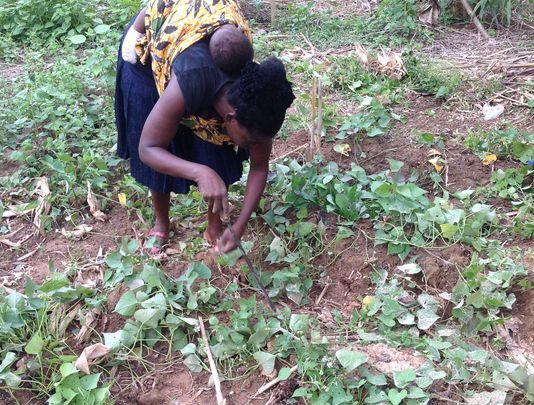
Amos is a lucky boy. His mother, Felicia Mensah, is one of the first parents to join the “Growing Healthy Foods, Growing Healthy Children” pilot program that has been offered in this rural African village by Self-Help International, a Waverly, Iowa, organization that will celebrate its 60th year in 2019.
Mary Jane Oakland addresses a mothers’ and infants’ meeting in Beposo, Ghana, on Sept. 25. (Photo: Self-Help International/Special to the Register)
The mothers and infants enrolled in the “Growing Healthy Foods, Growing Healthy Children” program gathered on Sept. 25 so that Self-Help nutritionists could measure and record the weights and heights of the mothers and babies to gauge their progress in meeting the program’s goal of eliminating the stunting of preschool-age children.
The importance of improving infants’ and expectant mothers’ nutrition will be underscored on Oct. 18, when the 2018 World Food Prize is awarded to Drs. Lawrence Haddad and David Nabarro for their individual efforts in reducing maternal and early childhood malnutrition in Africa, South Asia and Latin America.
Baby Amos is a living example of the global leadership that Haddad and Nabarro have provided “in elevating maternal and child under-nutrition within the food security and development dialogue at national and international levels with the result of reducing the world’s number of stunted children by 10 million between 2012 and 2017,” as the announcement of their selection as World Food Prize laureates stated.
Haddad’s and Nabarro’s emphasis on improving nutrition for mothers and children in the critical first 1,000 days of life – the period from pregnancy to a child’s second birthday – is also the basis of Self-Help’s “Growing Healthy Foods, Growing Healthy Children” intervention, which began in February under the guidance of the Rev. Dr. Mary Jane Oakland, an emeritus professor of Food Science and Human Nutrition at Iowa State University and a retired Episcopal priest. She has served on Self-Help’s board of directors since 2006.
When Oakland traveled to Ghana in January 2018, she began to work on a program with Self-Help’s staff nutritionists to grow local foods that mothers can use as a weaning supplement that would be more nutritional for the child to prevent stunting.
In September, Oakland and the two of us returned to Ghana to monitor and advise on Self-Help’s programs, including the “Growing Healthy Foods, Growing Healthy Children” pilot program in Beposo.
Self-Help International’s mission is to alleviate hunger by helping people help themselves.
Self-Help works with school parent-teacher associations to start school farms where parents and students learn improved farming methods that they can use to increase crop yields. The emphasis is on growing nutrient-rich crops such as Quality Protein Maize (QPM), which was championed by Norman Borlaug, founder of the World Food Prize and Nobel Peace Prize laureate in 1970.
The QPM produced on the school farm is then prepared by a community volunteer into a breakfast porridge that is served to the children each morning. The schools report increased enrollment, improved daily attendance, and higher test scores when children have breakfast to start the school day.
As a key ally of Self-Help, Borlaug endorsed this project as “a simple and practical solution to alleviating hunger.”
Self-Help staff found that more than 25 percent of the children are coming to school stunted, which is slightly above than the national average of 22 percent in rural Ghana. Stunting affects their ability to learn, Oakland observed. The “Growing Healthy Food, Growing Healthy Children” program grew out of the need for an intervention that could reach the mothers of infants before the children begin school during the critical phase of childhood brain development.
The intervention targets pregnant women, lactating mothers, and the parents of weaning children like Amos. It combines nutrition education with healthy foods to fill the nutrition gap among mothers who are not consuming enough calories to properly grow and nourish their children.
Self-Help’s Ghanaian nutrition staff specialist, Jesse Jackson Sarkodie, has been working extensively with the 59 expectant and new mothers living in the village of Beposo to educate them about the importance of good nutrition for the development of healthy children.
To address household food security long-term, Self-Help’s agriculture training team has been teaching parents how to intercrop QPM with legumes and to grow nutrition-rich sweet potatoes. Self-Help is also using its micro-credit and farm-input loan programs to introduce poultry.
In order to enroll in this intervention, the mother (and father when possible) must commit to both farming and nutritional counseling, which are the educational components of the program.
“Still, at the end of the day, we won’t turn a mother away,” she stated. “We initially planned for 50 mothers and babies in the first year, but here we are eight months in and we already have 59 mothers and babies enrolled, so we’re working on finding the resources to ensure we can meet that commitment to support every mother in need.”
Meeting Self-Help’s goal of eliminating infant stunting means that, in four years when baby Amos starts school, every one of his classmates will be well-nourished and living up to his or her biological potential.
Nora Tobin is executive director of Self-Help International.
Jerry Perkins is a board member of Self-Help and a former Des Moines Register reporter.
How you can help
Here’s how you can help end the stunting and chronic malnutrition of mothers and children in Beposo:
This intervention will cost an estimated $13,000 in the first year to serve 65 women and their 65 babies (or $4 per person, per week) including nutrition education and supplements, ag inputs and training, and transportation to provide skilled expertise. To make a one-time or on-going gift to support a mother and child in Beposo, Ghana, please contact Nora Tobin at nora@selfhelpinternational.org or 319-352-4040.
Nora Tobin and Jerry Perkins, desmoinesregister.com







